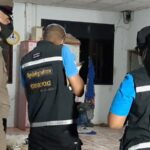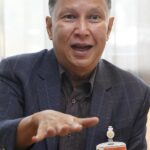Several thousand anti-government protesters rallied in Thailand’s capital on Saturday to call for a new constitution, new elections and an end to repressive laws.
Chanting and waving placards, the demonstrators, comprising mainly younger Thais, converged on Bangkok’s iconic Democracy Monument in the old part of the city, a popular venue for dissent.
The gathering, organized by a group calling itself Liberation Youth, was the biggest of its kind since the government called a state of emergency in March to deal with the coronavirus.
Protests against the government of former army chief Prayuth Chan-ocha had been drawing increasingly large crowds at the time, but tapered off quickly when several coronavirus clusters were confirmed and the emergency law was invoked.
Lockdown measures and social distancing have since helped the government contain the spread of the virus, but it has retained emergency powers, which critics say it wields as a political weapon.
The earlier protests were fueled by a February court ruling dissolving a popular opposition political party whose democracy-promoting policies had attracted substantial support among younger Thais. The supporters of the Future Forward party believed the group was targeted for its popularity and for being critical of the government and the military.
The political atmosphere heated up again in June, when a prominent self-exiled Thai political activist was snatched off the street by unknown men in neighboring Cambodia’s capital, Phnom Penh. He has not been heard from since. Several other Thai dissidents in Laos, another neighboring country, were also mysteriously kidnapped in recent years, with the bodies of three later found floating in the Mekong River.
Leaders at Saturday’s protest made speeches calling for sweeping change, and a radical rap group belted out a popular, acerbic political song.
Organizers put the number of protesters at more than 2,000, with more arriving as darkness fell.
Police ringed the monument and set up barriers to try to prevent the protesters from occupying it. Police loudspeakers played a recording of the text of the emergency law in an apparent warning that they considered the gathering illegal.
Prayuth first took power when, as army chief, he led a coup to overthrow the elected government in 2014. He then retained the prime minister’s post in 2019 after an election that was widely denounced as free but not fair, with conditions skewed in favor of a military-dominated party both before and after polling.
Under his deeply conservative leadership, the military and the royalist elite have consolidated their power, increasingly angering more progressive elements in Thai society.




